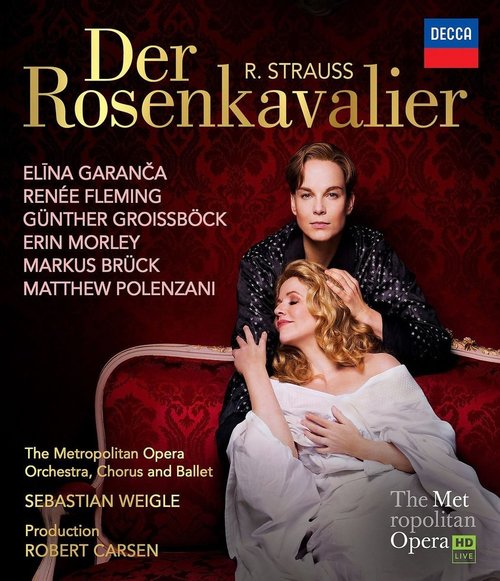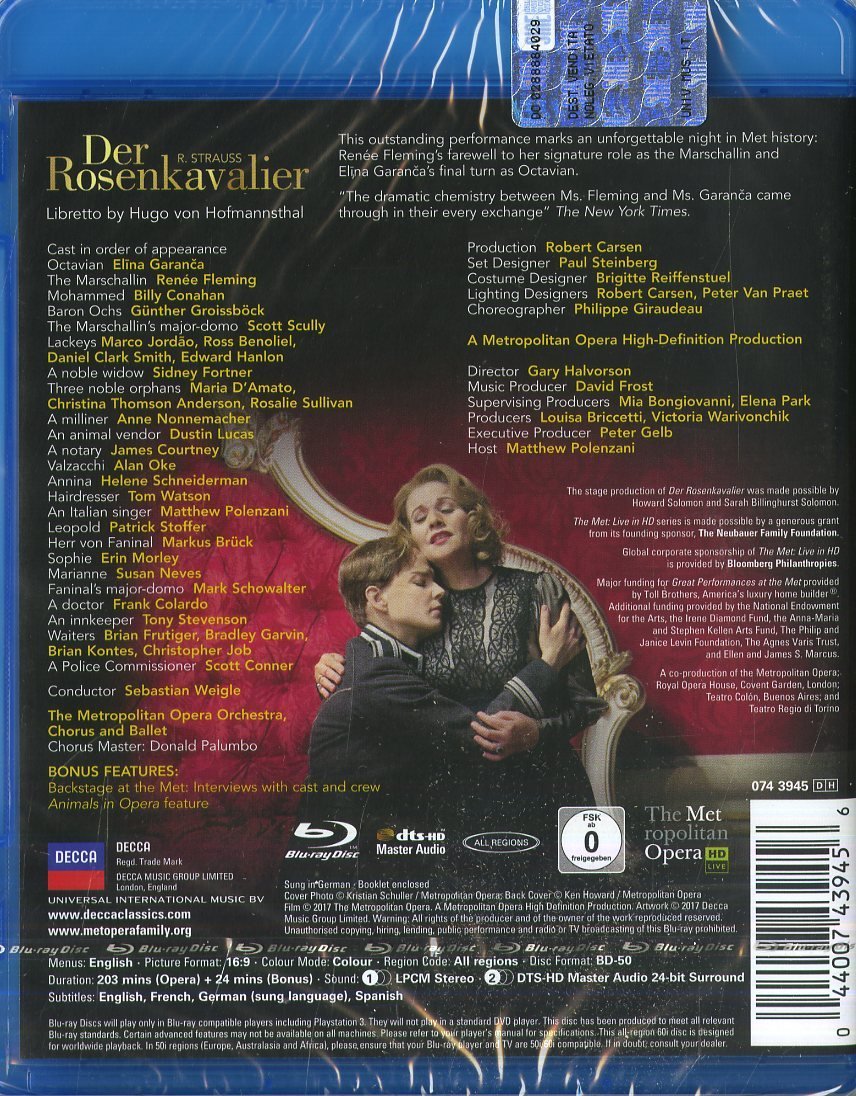

Richard Strauss Der Rosenkavalier opera to libretto by Hugo von Hofmannsthal. Directed 2017 by Robert Carsen at the The Met. Stars Elīna Garanča (Octavian), Renée Fleming (Marschallin), Billy Conahan (Mohammed), Günther Groissböck (Baron Ochs), Scott Scully (Major-domo), Marco Jordão, Ross Benoliel, Clark Smith, Edward Hanlon (Lackeys), Sidney Fortner (Noble widow), Maria D'Amato, Christina Thomson Anderson, Rosalie Sullivan (Three noble orphans), Anne Nonnemacher (A milliner), Dustin Lucas (An animal vendor), James Countney (Notary), Alan Oke (Valzacchi), Helene Scheiderman (Annina), Tom Watson (Hairdresser), Matthew Polonzani (An Italian singer), Patrick Stoffer (Leopold), Markus Brück (Herr von Faninal), Erin Morley (Sophie), Susan Neves (Marianne Leitmetzerin), Mark Schowalter (Faninal's major-domo), Frank Colardo (Doctor), Tony Stevenson (Innkeeper), Brian Frutiger, Bradley Garvin, Brian Kontes, Christopher Job (Waiters), and Scott Conner (Police Commissioner). Sebastian Weigle conducts the The Metropolitan Opera Orchestra and Chorus. Sets by Paul Steinberg; costumes by Brigitte Reiffenstuel; lighting by Robert Carson and Peter Van Praet; choreography by Philippe Giraudeau. Directed for TV by Gary Halvorson; Music Producer David Frost; Supervising Producers Mia Bongiovanni and Elena Park; Producers Louisa Briccetti and Victoria Warivonchik. Sung in German. Released 2017, disc has dts-HD Master Audio sound. Grade: A+
This was the last production of Rosenkavalier in which Renée Fleming (on your left below) plays the Marschallin (who is supposed to be about 35) and Elīna Garanča in trousers plays the Marschallin’s lover Octavian (who is supposed to be about 17) :
Robert Carsen and the Met came up with stupendous sets such as the Marschallin’s bedroom below:
Carson shifts the time from 1740 to 1911 (the year the opera premiered). Below we see Günther Groissböck as Baron Ochs. Carson presents Ochs not as a clown or senile fool but as a multi-dimensional man who could have existed at the time and who will (like all the other main characters) learn something from the misadventures coming up. Ochs, desperately short on funds, is visiting the Marschallin seeking advice about his impending marriage to a young girl whose family seeks the title of Baroness. The pretty girl he mentions below is, however, not his bride-to-be but “Mariendel,” the Marschallin’s maid (who is really Octavian dressed as a girl). Hugo von Hofmannsthal’s wickedly clever libretto demands that you stay on your toes:
This is a comedy leavened with a lot of melancholic philosophy. The Marschallin knows she can’t keep her young lover forever, but she doesn’t know how short the fuse actually is:
The only truly admirable character around is Sophie (Erin Morley), the 16 year-old-bride-and-baroness-to-be whose father has become incredibly rich making the arms and ordinance that will soon be used to destroy millions of souls in World War I:
Octavian, whose proper name is Count Rofrano, is drafted by Ochs to deliver, as the Rosenkavalier, the customary silver rose to Sophie as a token of the love that Ochs bears for her (we understand the silver rose business was never a real custom):
Oops! You are supposed to ignore the messenger, not fall in love with him, and vice-versa:
Inflamed by a true love, Sophie savagely reacts to Ochs’s rustic and risque manners:
Inspired, Octavian embarks on an elaborate plot to interdict Sophie’s marriage. He will discredit Ochs in the eyes of Herr Faninal, Sophie’s father:
Pretending to be the maid Mariendel again, Octavian in Act 3 invites Ochs to an assignation. Most productions put this in a cheap inn that’s easy to whip up with props found in every opera warehouse. But as you can see from the next shot, that’s not the Met way—it looks like they bought an entire bordello in Paris and moved it to Manhattan:
Elīna Garanča again—a woman playing the role of a man pretending to be a girl:
Ochs is beginning to feel uneasy about what’s going on:
Next below another example of wicked wit from Hugo von Hofmannsthal. Ochs is just saying that anything goes in the whorehouse. He doesn’t realize that he is in fact not going to be a bridegroom and he is not drinking with a maid:
Octavian has Herr Faninal called to the scene where he discovers numerous reasons why Sophie should not marry Ochs (including the fact that Ochs is really bald):
Suddenly the Marschallin arrives to broker a détente. She releases both Octavian and Sophie to be with each other.
And even Ochs shows signs of newfound introspection. The Marschallin can help him in many ways, and he can forget that he ever saw Octavian connected amorously with her:
The parting of the Marschallin and her lover:
Next we planned to show a screen shot of the famous trio near the end of Act 3. But then we found this official Met clip. It was probably made early in the production run and differs a bit from the HD Live disc shot later. The clip is in SD, but it’s pretty good:
Now back to our last screenshot:
Finally, another official Met clip below shows the famous ending duet between Octavian and Sophie:
You can always count on the Met to tell the story well. Be assured there are many intriguing aspects of this opera that we have not been able to touch on in this general review. One could imagine a show with younger stars that would be equally delightful, but you couldn’t count on younger singers ever receiving the kind of all-around support that the Met brings the the stage here. Mike Ashman, writing in the March 2018 Gramophone (at pages 89-90) lauds both retiring superstars as well as Groissböck and Morley. He approves Carsen's updating to the WW I era and concludes that this title "can be recommended in a crowded market." So the Met gets another A+ for its HD Live efforts published in Blu-ray.
OR



















